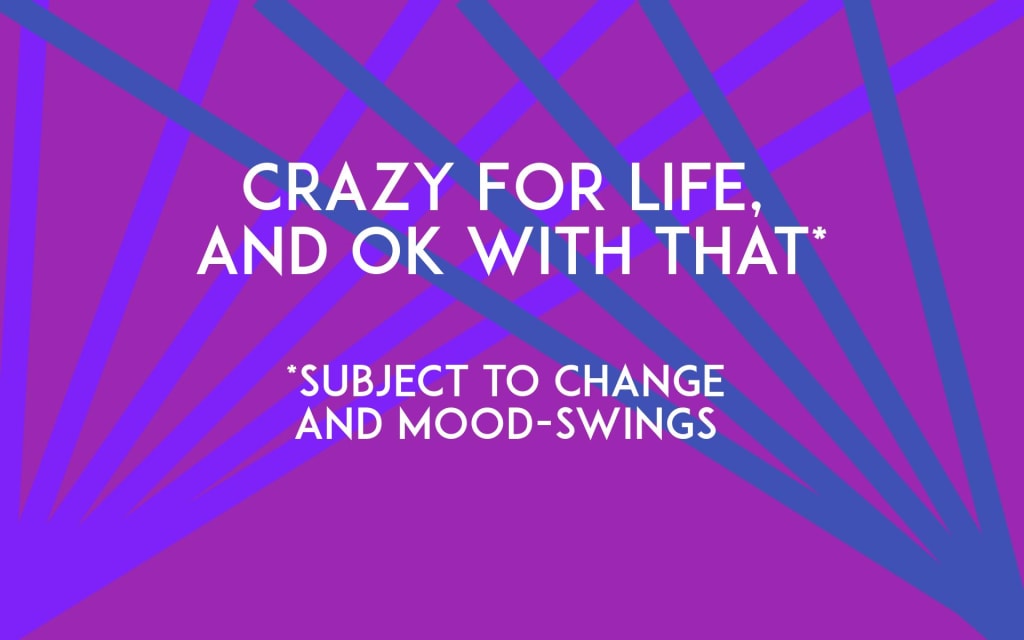Crazy for Life, and Okay with That
Subject to Change and Mood Swings

So in hindsight, I should have called this "Crazy for life and Working with That," but I've already made the graphic so sod it.
So I have depression, and a range of other unique and surprising symptoms of mental health illness. I'm 22-years-old and this summer I celebrated 6 years since my last OD. This is huge. It doesn't mean that I'm free of all mental health issues, or that I never make bad choices when it comes to self care, but it does mean that I am the healthiest I have ever been.
Six years ago I started to look at my future and what that meant for me. Up until that point I had never considered living to the age of 18 as a reality for me, let alone having a "career" or even being "mentally stable." But something changed. I don't know if the years of therapy and medication had finally worked their way in, or if the experience of being an inpatient in a psychiatric unit shocked me straight. But something did change. I started to acknowledge my patterns; the cycles of high productivity followed by a complete crash, the need to be absorbed by my work whilst tying a lot of my identity to the projects I was involved with. And I realized that I was going to have to find work that fitted to me, not the other way around.
It is safe to say there was a lot of trial and error. Over the next few years, (and probably more to come) I experimented with different jobs, different roles, different industries. Always starting from the bottom, and always working my way up. There were a couple things I noticed right away like: I am a shitty, shitty barista, I hate working in customer service, office politics can be horrific, and I have an unending ability to take any normal situation and create and embarrassing moment that will haunt me for years to come. However, fundamentally what it came down to was: 1) This works, or 2) This doesn't work. And if the answer was 2 it was time to move on.
And so I did. I moved on and each time I got closer and closer to having a job (and an income) that was right for me. With each job shift I ended up closer and closer to the creative industries, and it became pretty clear this wasn't a coincidence. Growing up, I never explored the idea of a job within the creative industries. I just assumed it wouldn't work, or I wouldn't be good enough, or it wasn't a reliable income. I'm happy to say that I was wrong on all three counts. Not only do I work well in the creative industries, people want to work with me again, and by some pure miracle, I am able to pay all my bills. Every. Single. Month.
It would be easy for the upshot of this post to be, "If you struggle with mental health issues, try the creative industries" but that's not what I'm saying.
Yes, the creative industries in all shapes and ever-expanding forms provide unrivaled opportunity. It is one of constant growth and there has never been a point in international history or humanity when the value and importance of creativity has been stunted to the point of extinction. To be involved in the creation of something is a rush. Even from an analytical or numerical standpoint. When a BBC TV production manager was asked what she was most proud of, she answered, "Balancing the budget," which on the outside doesn't seem that exciting, but for anyone who has worked in production, that is a brilliant moment, because you know what every penny bought, every fabulous crew member you hired, every stunt, every second in the edit, and every single one of those pennies adds up to one complete project that you can walk away from head held high. And that's just one moment, on one project, in one role, in one element of a huge industry.
But no, if you're still battling on a daily basis with mental health, I would not recommend leaping into the creative industries. With all this accomplishment comes a lot of hard work. I don't mean thinking you work hard, or working so hard you burn out. I mean knowing yourself, your weaknesses, adapting, compromising, balancing. And when you're still gaining tools to take care of yourself and fight your illness, that balancing act can tip very, very quickly. Instead, make mistakes. Many, many mistakes. Sure, exercise your creative muscles. Try everything, launch into your own projects. But when it come to the industry you want to call home, make those mistakes somewhere else. That shitty barista learnt how to handle obscene working hours, that awful customer service means I know how to handle actors with egos bigger than their trailers and bosses who can't quite see things from my side, those office politics—well they always suck, but learning how to work irrespective of them is huge. You will succeed in the industry you want. It may not be in the time scale, or the way you thought. But dreams can change. So when you're presented with your dream-job, the job you want to call home for years to come, make sure you've learnt from all your many, many mistakes.
About the Creator
Kirstyn Brook
Completely normal human. Nothing to see here.
But if you do want to chat all forms of correspondence are welcome.
Instagram: @kirstynbrook
To buy my most recent book check out: www.kirstynbrook.com






Comments
There are no comments for this story
Be the first to respond and start the conversation.